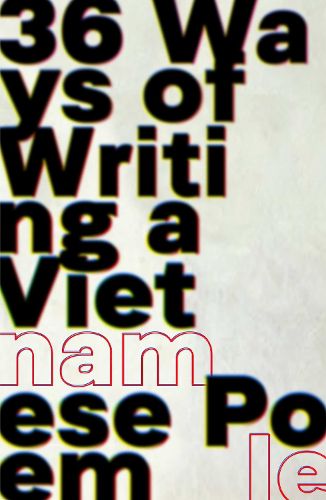Readings Newsletter
Become a Readings Member to make your shopping experience even easier.
Sign in or sign up for free!
You’re not far away from qualifying for FREE standard shipping within Australia
You’ve qualified for FREE standard shipping within Australia
The cart is loading…






36 Ways of Writing a Vietnamese Poem, says Le, a Vietnamese refugee to Australia, is ‘the book I need to write. The book I've been writing my whole life’. This book-length poem is an urgent, unsettling reckoning with identity and the violence of identity, embedded with racism, oppression and historical trauma. But it also addresses the violence in those assumptions – of being always assumed to be outside one’s home, country, culture or language. And the complex violence, for the diasporic writer who wants to address any of this, of language itself.
Making use of multiple tones, moods, masks and camouflages, Le’s poetic debut moves with unpredictable and destabilising energy between the personal and political, honouring every convention of diasporic literature – in a virtuosic array of forms and registers – before shattering the form itself. Like The Boat, 36 Ways of Writing a Vietnamese Poem conjures its own terms of engagement, escapes our traps, slips our certainties. As self-indicting as it is scathing, hilarious as it is desperately moving, this is a singular, breakthrough book.
$9.00 standard shipping within Australia
FREE standard shipping within Australia for orders over $100.00
Express & International shipping calculated at checkout
36 Ways of Writing a Vietnamese Poem, says Le, a Vietnamese refugee to Australia, is ‘the book I need to write. The book I've been writing my whole life’. This book-length poem is an urgent, unsettling reckoning with identity and the violence of identity, embedded with racism, oppression and historical trauma. But it also addresses the violence in those assumptions – of being always assumed to be outside one’s home, country, culture or language. And the complex violence, for the diasporic writer who wants to address any of this, of language itself.
Making use of multiple tones, moods, masks and camouflages, Le’s poetic debut moves with unpredictable and destabilising energy between the personal and political, honouring every convention of diasporic literature – in a virtuosic array of forms and registers – before shattering the form itself. Like The Boat, 36 Ways of Writing a Vietnamese Poem conjures its own terms of engagement, escapes our traps, slips our certainties. As self-indicting as it is scathing, hilarious as it is desperately moving, this is a singular, breakthrough book.
Nam Le’s first book, the award-winning volume of short stories titled The Boat, not only exceeded all expectations, but also shattered them. For a book of short stories to be so widely read, praised, and reviewed is exceedingly rare. In The Boat, readers found a collection of beautifully polished gems, tales that resonated around the world and continue to do so today. Consequently, the name Nam Le excites people. In short, Le can write. He knows the rules: he can play with them, break them, and totally up-end them, as he has done in his debut book of poetry, 36 Ways of Writing a Vietnamese Poem.
A book that rewards close reading, it thrums with anger and conflict. It is complex, raw and defies easy categorisation. Le plays with style, structure and form across the breadth of this work, never allowing the reader to get comfortable. It is by turns harsh, unexpectedly funny, moving, and lyrical. This is the kind of read that makes reading worthwhile.
Though this is a short book, it is not one that is easily digested in one sitting. Le, who arrived by boat with his parents when he was one, is engaged in a reckoning with the past – his own, and the pasts that live through him. There is an intensity and energy to his contemplations as he confronts the issues that have been plaguing him. The themes are big, deeply personal, and intricate – race, identity, generational trauma, home(s), and the metaphysics of feeling and knowing. There is conflict and questioning, both internal and external, and about stories and to whom they belong. Ideas and the self fuse and spar; it feels at times like a beautifully composed unravelling.
I am not sure I have ever read anything quite like it, but I do know that I will read it over and over, and may still never fully understand it, but perhaps that is part of the beauty of this work.
See what the Readings’ team have to say on the blog, discover related events and podcast episodes.
Rediscover classic poetry or find a new favourite from modern poets like Rupi Kaur, Maxine Beneba Clarke and Padraig O Tuama.
Discover the novels and poetry from the guests of the 2025 Melbourne Writers Festival – a star-studded line-up of local and international writers!
Read beloved and emerging Australian poets like Judith Bishop, Jazz Money and Nam Le.